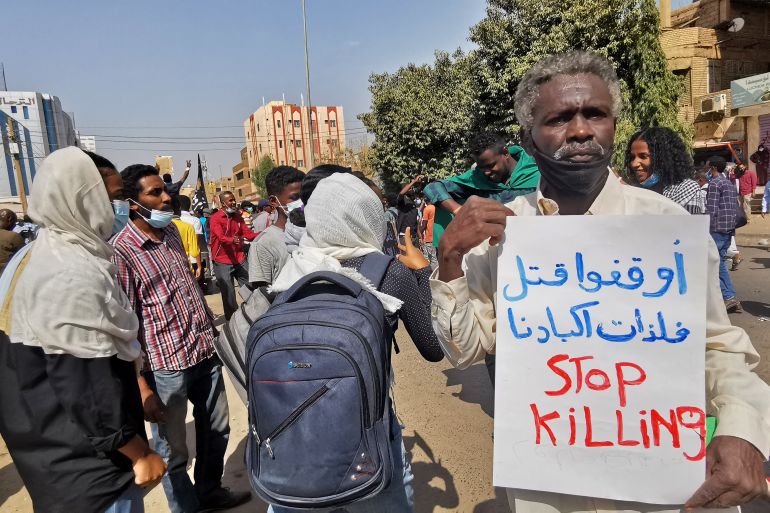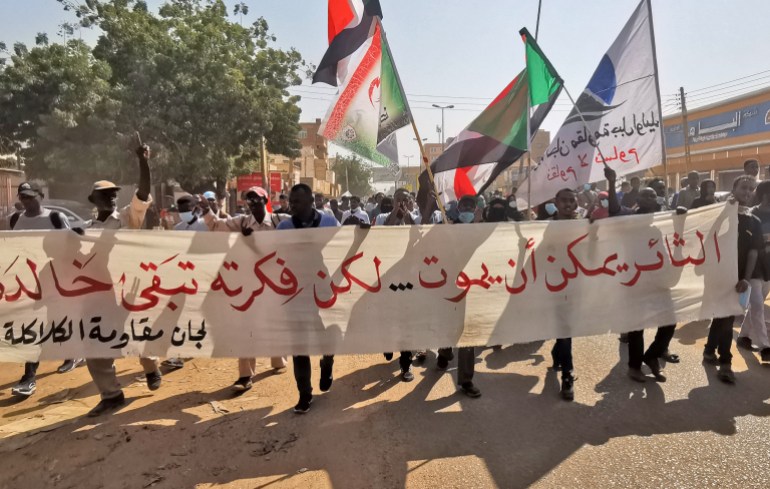Sudan security forces fire tear gas at anti-coup protesters
A protester and a security officer have been killed as protests continue against the October 25 military coup.

A senior police officer and a protester were killed, according to authorities and a medical group, as thousands took to the streets of the Sudanese capital to protest against a military coup that has plunged the country into grinding deadlock.
The demonstrations on Thursday in Khartoum and elsewhere in Sudan are the latest in a series of protests since the military on October 25 overthrew the civilian-led government of Prime Minister Abdalla Hamdok.
Keep reading
list of 3 itemsUncertainty in Sudan as PM resigns: All you need to know
What next for Sudan after PM Hamdok’s resignation?
Security forces used tear gas to disperse those marching in a main Khartoum street leading to the fortified presidential palace, according to the pro-democracy movement. Online videos show white smoke – apparently from tear gas – as protesters try to take cover and others hurl stones at the troops.
Protesters chanted: “With all our power, we are heading to the palace” as they converged on the city centre, witnesses said.
In Khartoum’s Bahri district, protester Al-Reeh Mohammad was shot in the stomach and killed when when security forces intervened with live ammunition to break up the march, according to the Sudan Doctors Committee.
Dozens of other protesters were wounded.
The military takeover has upended Sudan’s transition to democratic rule after three decades of repression and international isolation under former President Omar al-Bashir. The North African nation has been on a fragile path to democracy since a popular uprising forced the military to remove al-Bashir in April 2019.

Demonstrators, mostly young people, marched in different locations in Khartoum and its twin city of Omdurman, footage circulated online showed. There were also protests in the restive western region of Darfur.
The protesters demanded the removal of generals from power and the establishment of a fully civilian government to lead the transition.
Meanwhile the police said an officer was killed while providing security to the protest close to the presidential palace.
Brigadier General Ali Bareema Hamad “fell martyr while doing his duties and securing protests” in the capital Khartoum, a police statement said on Facebook.
Hamad “received deadly stabs by groups of protesters… in different parts of his body,” police spokesman Idris Abdalla Idris told Sudan TV.
Al Jazeera’s Mohamed Vall said while the police did not accuse anyone specifically of being behind the killing, they have “stepped up” their presence on the capital’s streets.
“The streets are brimming with [security] forces in their vehicles, marching, using tear gas and water cannons,” he said.
For their part, the protesters “have reiterated that they are peaceful”.
“They said their history is clear and they have never carried knives or weapons during the demonstrations,” Vall said.
“The incident today is dangerous because the military might try to accuse the protesters of being violent or might say that there are elements within the protesters’ [ranks] who would like to turn this into a bloody confrontation.”
More than 60 people have been killed, and hundreds of others injured in the near-daily protests since the coup.
UN push to facilitate talks
The United Nations has repeatedly urged authorities to cease their crackdown on protesters and hold accountable those responsible for killings in previous rounds of protests.
The UN mission in Sudan began separate consultations earlier this week with Sudanese groups, to try to bridge the widening gap between the military, led by General Abdel Fattah al-Burhan, and the pro-democracy movement.
The latest UN push received a mixed response from Sudanese factions.
The Sudanese Professionals Association, an independent trade union confederation which has been instrumental in organising the protests, said it completely rejected the UN-facilitated talks.
The mainstream faction of the Forces for Freedom and Change, the leading civilian pro-democracy group, said it will “discuss” the invitation internally and announce its vision.
Spokesman Wagdy Saleh said the FFC rejected “any partnership” with the military.
Protesters have also rejected the UN talks.
“We don’t accept this initiative at all,” 62-year-old protester Awad Saleh said. “It’s not clear what points it constitutes and so for us it is deficient.”
However, the ruling Sovereign Council – formed by al-Burhan following the coup with himself as chairman – welcomed the talks.
Hamdok, who was the civilian face of Sudan’s transitional government in the past two years, resigned earlier this month, citing failure to reach a compromise between the generals and the pro-democracy movement. After weeks of house arrest, he was reinstated in November in a deal with the military that angered the pro-democracy movement.
In his resignation speech, Hamdok warned that Sudan was now at a “dangerous crossroads threatening its very survival”.
The movement insists that a fully civilian government lead the transition, a demand rejected by the generals who say power will be handed over only to an elected government. Elections are planned in July 2023, in line with a 2019 constitutional document governing the transition period.
The coup came a few weeks before the military should have handed over the leadership of the ruling sovereign council to civilians, according to the constitutional document.